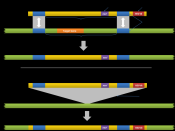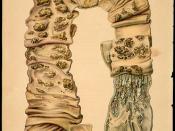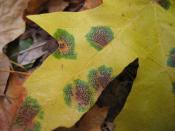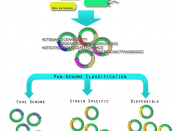Mechanisms of disease
Thaisa Cantu
The development of molecular genetics has brought about important changes in the knowledge of physiopathology of the disease, modifying the criteria for diagnosis and treatment and presenting the physician with new concepts. The greatest point of discussion between the articles is about the importance that is given to genetics and if it worth to substitute the clinical researches for genetic ones.
Defining Disease in the Genome Was by LK Temple, et al. define disease as a state that puts someone in a bigger risk of have adverse consequences. The article emphasizes that the elementary key in this definition is "risk". One gene abnormality that isn't associated with the risk should not be considered synonyms of disease. Neither all the mutations nor genetic abnormalities are associated with health problems. So that before a mutation shows a defined risk to produce adverse effects, people that present this alteration should not be considered illness.
In Complex Disease and the New Clinical Sciences, Jonathan Rees points out that the knowledge about genes can be unable to improve the handling of patients with a disease. Many times the genetic knowledge barely serves as an explanation for a treatment that already was being applied before, based in clinics finds.
The author proposes that genetics and clinical science are interdependent and should be treated with same importance. He criticizes the fact that all sciences are being seeking by a genetic viewpoint and stands out the importance of clinical science for the definition and handling of disease. Rees affirms that genetics says much more about someone's knowledge than about disease.
I comply with Rees when he says that the researches in genetic and clinical science possess have equal importance and are interdependent, but also I believe that both of them affect the handling of illness with the same importance, in different ways.
The human genome sequence consists in a sequence of billions of nitrogen bases pairs (adenine, thymine, guanine and cytosine) that constitute the humans genes. The knowledge about the order of the nitrogen bases pairs that are chained in chromosomes is fundamental to study the operation of the heredity mechanisms and genes expression, what should accelerate the comprehension of how genetic influences the sprouting and open horizons for the development of new handlings. The phenotype of an organism (specific manifestation of a characteristic) can be determined by the genotype (identity of the alleles that an individual possessed in or in more local of the chromosomes). However, in most of the times, the phenotypes are determined by multiple genes and influenced also by environmental factors. Thus, not always the identity of one or some known alleles permits us to foresee the phenotype. As a result, all that the genome sequence can is to show the risk of a person to develop determined illnesses, and not predict if a disease really will occur.
Disease can be identified as a permanent or transitory incapacity of maintain the homeostasis in the human body. The equilibrium between the functions in the organism is a process. So, we could say that it's a continuous cycle health-illness that develops not only in the interior of the body but between that and the environment.
On the other hand the study of the genes and identification of the responsible for illnesses can revolutionize the preventive medicine, genetic counseling, early diagnosis, therapy and cures of many illnesses. The treatment of some disease will be able to begin before the symptoms. Another important consequence is in the sprouting of bigger possibilities in the development of more efficient and specific drugs to treat disease.
We can't isolate the study of genes without evaluate and consider one's general condition, and his interaction with the environment he lives. Clinics and genetics are complementary, and should be treated as allies in order to be a complete science, capable to identify the cause of disease wherever it is (in genes or not), all the transformations generated in the body by those disease, and all handling possibilities based in genetics and clinical finds. By this way, we could chose the more adequate handling and treat an illness looking at the human as a whole.





